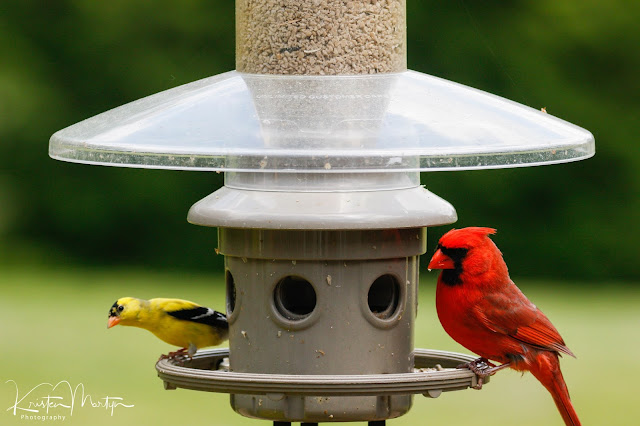 |
| American Goldfinch and Northern Cardinal feeding from Eliminator feeder |
Why cleaning feeders is important
No one wants to do it. It's not fun, it can be time consuming, and sometimes it's just gross, but maintaining clean bird feeders is one of the most important things you can do for many reasons. Cleaning your feeders regularly (at least once per month) helps limit the spread of disease, bacteria, and parasites, helps keep seed fresh for a longer period of time by decreasing the chance of mold growth, reduces the risk of feeder malfunction, and increases the lifespan of the feeder. Keeping your feeders clean will lead to increased bird activity. Birds (much like us) enjoy high quality food, served in a clean environment. Clean feeders are much more likely to attract a variety of beautiful birds to choose your backyard as their go-to dining area.
No one wants to do it. It's not fun, it can be time consuming, and sometimes it's just gross, but maintaining clean bird feeders is one of the most important things you can do for many reasons. Cleaning your feeders regularly (at least once per month) helps limit the spread of disease, bacteria, and parasites, helps keep seed fresh for a longer period of time by decreasing the chance of mold growth, reduces the risk of feeder malfunction, and increases the lifespan of the feeder. Keeping your feeders clean will lead to increased bird activity. Birds (much like us) enjoy high quality food, served in a clean environment. Clean feeders are much more likely to attract a variety of beautiful birds to choose your backyard as their go-to dining area.
.jpg) |
| House Finch with suspected House Finch Eye Disease |
Many illnesses are contracted through bird-to-bird contact, or through contaminated surfaces. Because of this, it is extremely important to thoroughly clean and disinfect all feeders, birdbaths, and feeding equipment. While there are numerous maladies that can affect birds, the ones most commonly found in backyard birds are House Finch Eye Disease, Avian Pox, Trichomoniasis, and Salmonellosis. It is nearly impossible to diagnose these illnesses by sight alone (with the exception of maybe Avian Pox) as many have similar symptoms as stated above. These symptoms include difficulty flying, feeding, or drinking, lethargy, crusty or runny eyes, abnormal lumps or lesions on the skin, laboured breathing, a "puffed" or hunched appearance, and an apparent lack of fear when approached. Click here to learn more about these illnesses and what to do if you find a sick bird in your yard.
 |
| A variety of easy-to-clean WBU Bird Feeders |
How to properly clean bird feeders
Seed Bird Feeders:
- When cleaning your feeders, it is always best to wear rubber gloves if possible. If not, ensure that you wash your hands thoroughly upon completion.
- Use a brush to remove dirt, and any visible mold.
- Using a 10% Bleach Solution soak feeders for a minimum of 10 minutes to help loosen grease and dirt build-up. Using your brush again, clean feeders thoroughly (a long-handled bottle brush works well on tube feeders). A toothbrush can be a handy tool for scrubbing the feeding ports and other small parts. Brushes designed specifically for cleaning bird feeders are the best choice.
- When all dirt, grease and mold have been removed, rinse all parts of the feeder thoroughly for at least 15 seconds in very warm, clean water to be sure all chemical residue is removed.
- It is important to completely air-dry feeders before reassembling and filling with feed. Any remaining moisture could lead to mold and mildew that can cause illness and rotten, unhealthy seed.
- Take time while cleaning the feeder to inspect it for sharp points or edges that can scratch or cut birds. Small wounds can open the door for bacteria and viruses to infect otherwise healthy birds.
 |
| Ruby-throated Hummingbirds feeding from WBU High Perch Hummingbird Feeder |
Nectar Feeders
Purchase a hummingbird feeder that is easy to take apart and clean. Clean following the same instructions as for seed feeders. Nectar Feeders should be cleaned every time the solution is changed, (during extreme heat - every 1-3 days, in cooler temperatures, weekly), especially if the solution appears cloudy. Although the nectar solution may appear fine, if it starts to ferment, it can have a deadly effect on the hummingbirds, causing their tongues to swell and in turn, starving them to death.
Birdbaths
Remember to keep your birdbaths clean as well. Changing water every day or two is the best practice. When necessary, use a brush to clean out any dirt or algae from the birdbath and give it a rinse before refilling. Purchasing a water wiggler or dripper can keep the water in your birdbath moving, making it attractive to birds, as well as preventing mosquitoes from laying eggs.
Tip: The easiest way to clean bird feeders and birdbaths, is to clean them regularly, then the clean up will be minimal.
Happy trails!
- Shayna
















No comments:
Post a Comment